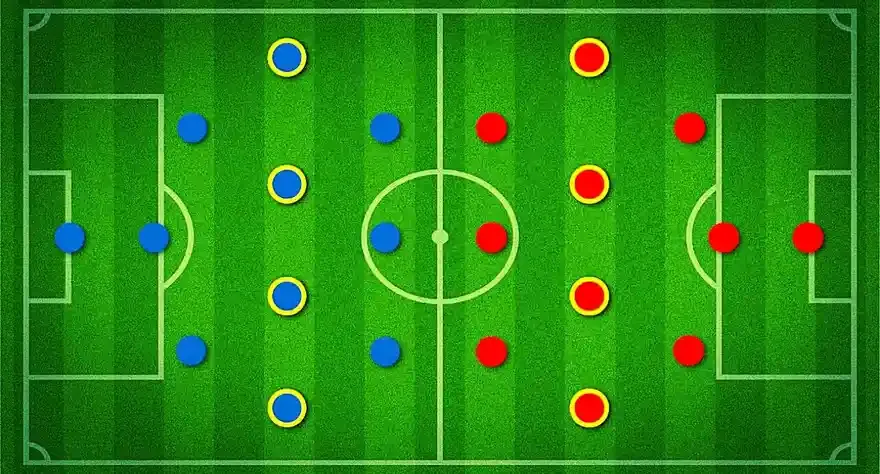Playing a player requires smart strategies and emotional intelligence to protect your heart while navigating complex dating situations.
When someone tries to manipulate your emotions or play games with your feelings, you need proven tactics to turn the tables.
This comprehensive guide reveals how to play a player at his own game without compromising your values or getting emotionally damaged.
You’ll learn the psychology behind player behavior, recognize warning signs early, and master counter-strategies that work.

What Does “Playing a Player” Actually Mean?
Playing a player refers to using strategic approaches to handle someone who manipulates emotions in relationships.
The play a player meaning involves recognizing manipulative tactics and responding with calculated moves instead of emotional reactions.
This doesn’t mean becoming manipulative yourself.
Instead, it means protecting your emotional well-being while maintaining control of the situation.
Playing a player requires understanding their psychology and using that knowledge to your advantage.
Key Elements of Player Psychology
Players typically exhibit specific behavioral patterns that you can identify and counter.
They often use emotional manipulation, hot-and-cold behavior, and multiple dating options simultaneously.
Understanding these patterns helps you develop effective response strategies.
Most players fear genuine emotional connection and use games as protection mechanisms.
This knowledge becomes your foundation for successful counter-strategies.
The “Play the Player, Love the Lover” Philosophy
The concept “play the player love the lover” suggests treating different people according to their behavior patterns.
This philosophy means matching energy levels and commitment to what others genuinely offer.
When dealing with players, you mirror their casual approach instead of investing deep emotions.
For genuine lovers, you reciprocate their authenticity and emotional availability.
Play the player love the lover meaning essentially translates to giving people exactly what they give you.
Understanding the Balance
- This approach requires emotional intelligence and clear boundaries.
- You’re not becoming fake or manipulative.
- Instead, you’re protecting yourself by matching the other person’s energy level.
- When someone shows genuine interest and consistency, you respond with equal authenticity.
- When someone plays games, you maintain emotional distance while engaging strategically.
Proven Strategies to Play a Player at His Own Game
Strategy 1: Master the Art of Emotional Detachment
Emotional detachment becomes your strongest weapon against player tactics.
Players rely on creating emotional dependency to maintain control over situations.
By staying emotionally neutral, you remove their primary source of power.
Practice viewing interactions objectively rather than through emotional filters.
This doesn’t mean becoming cold or unfeeling.
It means maintaining perspective and not allowing temporary emotions to dictate your decisions.
Key techniques for emotional detachment:
- Set clear mental boundaries before each interaction
- Practice mindfulness to stay present and aware
- Remind yourself that their behavior reflects them, not you
- Keep multiple options open to avoid over-investment
- Focus on your own goals and priorities
Strategy 2: Use the Scarcity Principle
Players often lose interest when things become too easy or predictable.
By making yourself less available, you increase your perceived value.
This doesn’t mean playing hard to get in manipulative ways.
Instead, genuinely prioritize your own life, goals, and other relationships.
When you’re not constantly available, players often become more interested.
Implementing scarcity effectively:
- Maintain busy schedules with activities you genuinely enjoy
- Don’t respond to messages immediately every time
- Keep plans with friends and family as top priorities
- Pursue personal goals and hobbies consistently
- Show that your life is fulfilling with or without them
Strategy 3: Mirror Their Energy Levels
How to play a player at his own game often involves matching their communication patterns.
If they take hours to respond, don’t reply immediately.
When they show minimal effort in planning dates, match that energy level.
This technique helps maintain balance and prevents you from over-investing.
Players notice when someone mirrors their behavior and often adjust accordingly.
Energy mirroring techniques:
- Match response times for messages and calls
- Reciprocate the effort level they put into interactions
- Mirror their level of future planning and commitment
- Reflect their emotional availability back to them
- Maintain the same casual or serious tone they establish
Strategy 4: Maintain Multiple Options
Playing a player successfully requires keeping your options open.
Don’t put all your emotional energy into one person who hasn’t proven their commitment.
This strategy protects you from disappointment and maintains your bargaining power.
Players often assume they’re your only option and act accordingly.
When they realize you have choices, their behavior often changes dramatically.
Building a strong dating foundation:
- Continue meeting new people even when interested in someone
- Maintain friendships and social connections actively
- Focus on personal growth and career development
- Don’t cancel plans with others for last-minute invitations
- Keep your social media presence diverse and engaging
Recognizing Player Behavior Patterns
Common Warning Signs
- Players exhibit predictable behavioral patterns that you can learn to identify quickly.
- Hot and cold communication represents one of the most obvious red flags.
- They might text constantly for days, then disappear without explanation.
- This pattern creates emotional confusion and dependency.
- Inconsistent availability shows through their scheduling and commitment patterns.
- They make plans but frequently cancel or reschedule at the last minute.
- Avoiding relationship discussions becomes apparent when you try to define the relationship.
- They deflect serious conversations about feelings or future plans.
- Multiple dating indicators include secretive behavior about their phone and social media.
- They might have dating apps still active or maintain suspicious friendships.
Advanced Recognition Techniques
- Pay attention to how they talk about past relationships.
- Players often blame all their exes or claim everyone else was “crazy.”
- Notice their friend groups and social circles.
- Players typically surround themselves with similar-minded people.
- Observe their social media behavior and how they interact with others online.
- Watch for patterns in their storytelling and whether details change over time.
The Psychology Behind Why These Strategies Work
Understanding Player Motivations
Players often fear genuine emotional connection due to past experiences or attachment issues.
They use games as protection mechanisms to avoid vulnerability.
Many players have low self-esteem disguised as confidence.
They need constant validation from multiple sources to feel secure.
Understanding these psychological drivers helps you respond appropriately.
Core psychological patterns:
- Fear of abandonment leading to preemptive emotional withdrawal
- Need for control in relationships to avoid feeling powerless
- Validation-seeking behavior masked as confidence
- Difficulty with genuine intimacy and emotional expression
- Past relationship trauma influencing current behavior patterns
Why Counter-Strategies Are Effective
When you don’t react emotionally to player tactics, you disrupt their expected patterns.
Players rely on predictable emotional responses to maintain control.
By staying calm and strategic, you force them to reconsider their approach.
Many players haven’t encountered someone who doesn’t fall for their usual tactics.
This unfamiliarity often leads to genuine interest or respectful withdrawal.

Building Emotional Resilience
Developing Inner Strength
Playing a player successfully requires strong emotional foundations.
You need confidence that doesn’t depend on external validation.
Practice self-care routines that maintain your emotional stability.
Build supportive friendships that provide honest feedback and encouragement.
Invest in personal growth through hobbies, education, or professional development.
Resilience-building activities:
- Regular exercise and physical health maintenance
- Meditation or mindfulness practices for emotional regulation
- Journaling to process experiences and emotions clearly
- Therapy or counseling for deeper self-understanding
- Creative outlets that provide personal satisfaction
Maintaining Perspective
Remember that player behavior reflects their issues, not your worth.
Don’t take their games personally or let them affect your self-esteem.
Focus on what you can control rather than trying to change them.
Keep your long-term relationship goals in mind when making decisions.
Celebrate small victories in maintaining your boundaries and self-respect.
Communication Strategies That Work
Setting Clear Boundaries
Communicate your expectations clearly without being demanding.
Let them know what behavior you will and won’t accept.
Don’t threaten or issue ultimatums that you’re not prepared to follow through on.
Be consistent in enforcing the boundaries you establish.
Remember that boundaries protect both people in the relationship.
Effective boundary communication:
- Use “I” statements to express your needs and limits
- Be specific about behaviors rather than making general complaints
- Remain calm and factual when discussing boundary violations
- Offer clear consequences for continued inappropriate behavior
- Follow through consistently with stated consequences
Strategic Conversation Techniques
Ask direct questions that require honest answers.
Don’t accept vague responses or deflection tactics.
Use silence effectively to encourage them to fill conversational gaps.
Pay attention to what they don’t say as much as what they do say.
Stay focused on your goals rather than getting distracted by emotional manipulation.
Advanced communication tactics:
- Ask open-ended questions that reveal their true intentions
- Use reflective listening to understand their actual messages
- Avoid defensive responses that escalate conflicts
- Practice assertive communication without aggression
- Master the art of strategic silence in conversations
Red Flags to Watch For
Immediate Warning Signs
Excessive charm early in the relationship often indicates manipulation tactics.
Be cautious of people who seem too good to be true initially.
Reluctance to introduce you to friends and family suggests they’re keeping options open.
Inconsistent stories about their past or current situations indicate deception.
Pressure for physical intimacy without emotional connection shows their priorities.
Future-faking involves making promises about future plans they never intend to keep.
Long-term Pattern Recognition
Notice whether their words match their actions consistently over time.
Pay attention to how they treat service workers, family members, and friends.
Observe their reaction when you say “no” to requests or suggestions.
Watch for patterns in how they handle conflict or disagreement.
Monitor whether they show genuine interest in your life and goals.
Social Media Red Flags
- Flirtatious comments with multiple people on their posts
- Photos that suggest they’re still actively dating others
- Secretive behavior about their online activities
- Dating app notifications or active profiles
- Inconsistent relationship status or vague descriptions
Advanced Tactics for Seasoned Players
The Reverse Psychology Approach
- Sometimes agreeing with their casual approach confuses manipulative people.
- When they suggest keeping things casual, enthusiastically agree.
- This removes their sense of control and often makes them reconsider.
- Players expect resistance and don’t know how to handle easy agreement.
- Use this technique sparingly and only when you’re genuinely prepared for any outcome.
The Strategic Withdrawal Method
- Gradually reduce your availability and emotional investment.
- Don’t announce this strategy or make it obvious.
- Simply become busier with other activities and less responsive.
- This technique often reveals their true level of interest quickly.
- If they don’t notice or care, you have your answer about their feelings.
The Direct Confrontation Strategy
- Sometimes directly addressing player behavior works effectively.
- Call out manipulative tactics calmly and factually.
- Explain how their behavior affects you without being emotional.
- Give them an opportunity to change or clarify their intentions.
- Be prepared to walk away if they can’t provide honest answers.
Protecting Your Emotional Well-being
Self-Care During Challenging Interactions
Maintain routines that support your mental and physical health.
Don’t let dating drama interfere with your sleep, diet, or exercise habits.
Keep trusted friends informed about your dating experiences for perspective.
Take breaks from dating when you feel emotionally drained.
Remember that your worth isn’t determined by any single person’s behavior.
Essential self-care practices:
- Regular sleep schedule and adequate rest
- Nutritious eating habits that support mental clarity
- Physical exercise for stress relief and confidence
- Time with supportive friends and family members
- Hobbies and activities that bring personal joy
Building Support Systems
Surround yourself with people who have your best interests at heart.
Seek advice from friends who have successful, healthy relationships.
Consider professional counseling if you find yourself repeatedly attracted to players.
Join social groups or activities where you can meet like-minded people.
Don’t isolate yourself or make dating your only social focus.
Recognizing When to Walk Away
Some players won’t change regardless of your strategies.
Know when to cut your losses and move on to better opportunities.
Don’t fall into the trap of trying to “fix” someone who doesn’t want to change.
Trust your instincts when something feels consistently wrong.
Remember that you deserve someone who chooses you consistently.

Common Mistakes to Avoid
Over-Analyzing Their Behavior
- Don’t spend excessive time trying to decode their mixed messages.
- Actions speak louder than words in all relationship situations.
- Stop making excuses for inconsistent or disrespectful behavior.
- Trust patterns over promises when evaluating someone’s intentions.
- Focus your mental energy on people who communicate clearly.
Compromising Your Values
- Never change your core values to accommodate someone else’s games.
- Don’t lower your standards hoping they’ll eventually meet them.
- Avoid pretending to be someone you’re not to maintain their interest.
- Keep your long-term relationship goals in mind when making decisions.
- Remember that the right person will appreciate your authentic self.
Playing Games You Don’t Understand
- Don’t adopt manipulative tactics that don’t align with your personality.
- Stick to strategies that feel natural and authentic to you.
- Avoid revenge-based approaches that could backfire negatively.
- Focus on protection rather than retaliation when dealing with players.
- Maintain your integrity throughout all dating interactions.
Ignoring Your Gut Feelings
- Trust your instincts when something feels off about someone’s behavior.
- Don’t rationalize away red flags or make excuses for poor treatment.
- Pay attention to how interactions make you feel emotionally.
- Listen to concerns from trusted friends and family members.
- Remember that intuition often recognizes patterns before logic does.
Frequently Asked Questions
Is it players or player’s when talking about multiple manipulative people?
Use “players” for multiple people who engage in manipulative dating behavior. The possessive “player’s” refers to something belonging to one player, such as “the player’s tactics” or “a player’s motivation.”
How long should I try these strategies before giving up?
Give clear patterns 2-3 months to emerge or change. If someone’s behavior doesn’t improve after consistent boundary-setting and strategic responses, it’s time to move on to better opportunities.
Can these strategies work on female players too?
Yes, these psychological principles apply regardless of gender. Player behavior patterns and effective counter-strategies remain consistent across different types of people.
What if I genuinely like someone who shows player tendencies?
A: Focus on their actions rather than potential. Use these strategies to protect yourself while giving them opportunity to demonstrate genuine interest through consistent behavior.
How do I know if someone is actually changing or just getting better at playing games?
Look for sustained behavioral changes over several months, introduction to their social circle, future planning that includes you, and consistent communication patterns.
How to play a player over text?
Keep replies playful but not too available.
Mirror his energy, but avoid showing too much interest.
Use wit and subtle teasing to stay in control.
How does a player flirt?
Players usually give fast compliments and sweet talk.
They often avoid deep conversations.
Expect charm mixed with inconsistency.
What does a player mean in love?
In love, a player often avoids commitment.
They may seek attention or multiple partners.
Their focus is usually short‑term attraction.
What is a player in slang terms?
A “player” is someone who dates or flirts casually.
They often juggle multiple interests at once.
It implies charm but lack of seriousness.
How do you play a player and make him want you?
Stay mysterious and don’t reply too quickly.
Flirt lightly without giving too much away.
Make him chase instead of you pursuing.
How to play a game while chatting?
Use fun conversation games like “20 Questions.”
Try flirty dares or “Would You Rather.”
Keep it playful and lighthearted.
How to play a player in dating?
Match his energy but don’t get attached.
Set boundaries and keep your options open.
Use charm while staying emotionally guarded.
How to play flirt over text?
Use humor, teasing, and light compliments.
Add playful hints without being too obvious.
Leave a little mystery to spark interest.
Conclusion: Mastering the Art of Playing a Player
Playing a player successfully requires emotional intelligence, clear boundaries, and strategic thinking.
The goal isn’t to become manipulative yourself, but to protect your emotional well-being.
Use these proven strategies to maintain control while giving genuine people opportunity to show their true intentions.
Remember that the right person will appreciate your authenticity and won’t require games.
Focus on building the confidence and skills that attract healthy, committed relationships.
Playing a player at his own game ultimately teaches you valuable life skills that extend far beyond dating.
You develop emotional resilience, better communication abilities, and clearer personal standards.
These improvements benefit all areas of your life and help you build more satisfying relationships.
The play the player love the lover philosophy ensures you give people exactly what they deserve based on their behavior.
Start implementing these strategies today and watch how your dating experiences transform for the better.
Your future self will thank you for learning to protect your heart while remaining open to genuine love.
